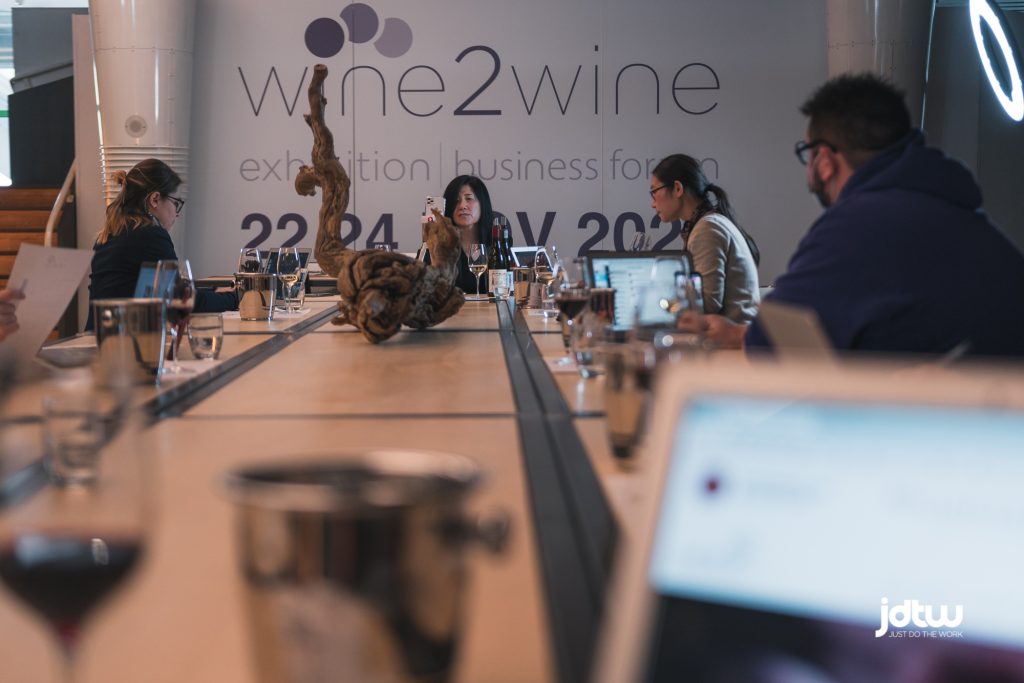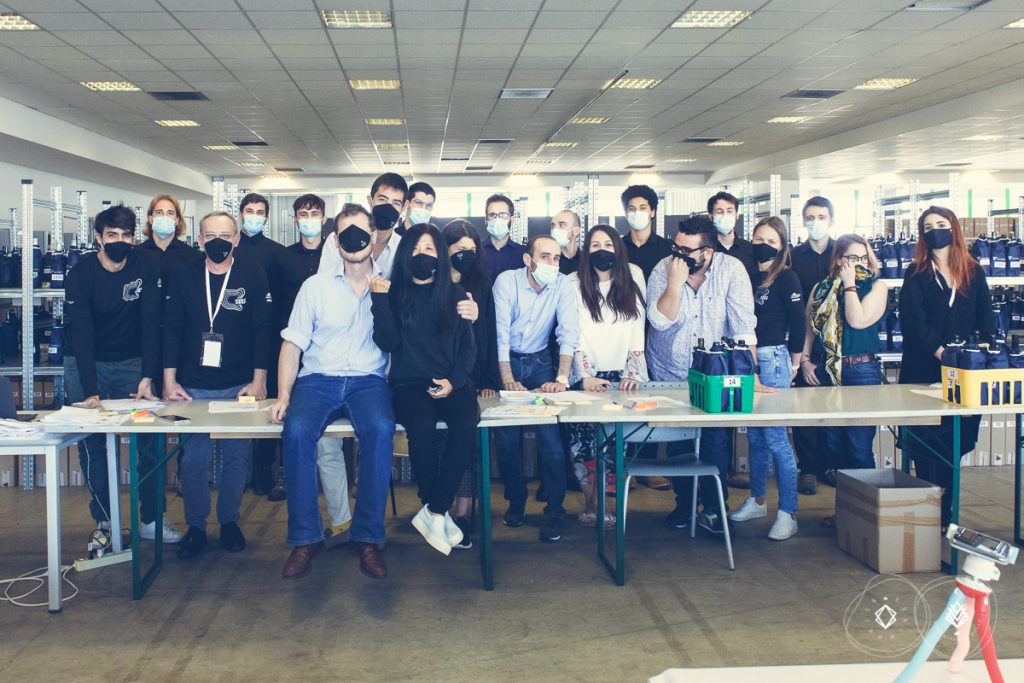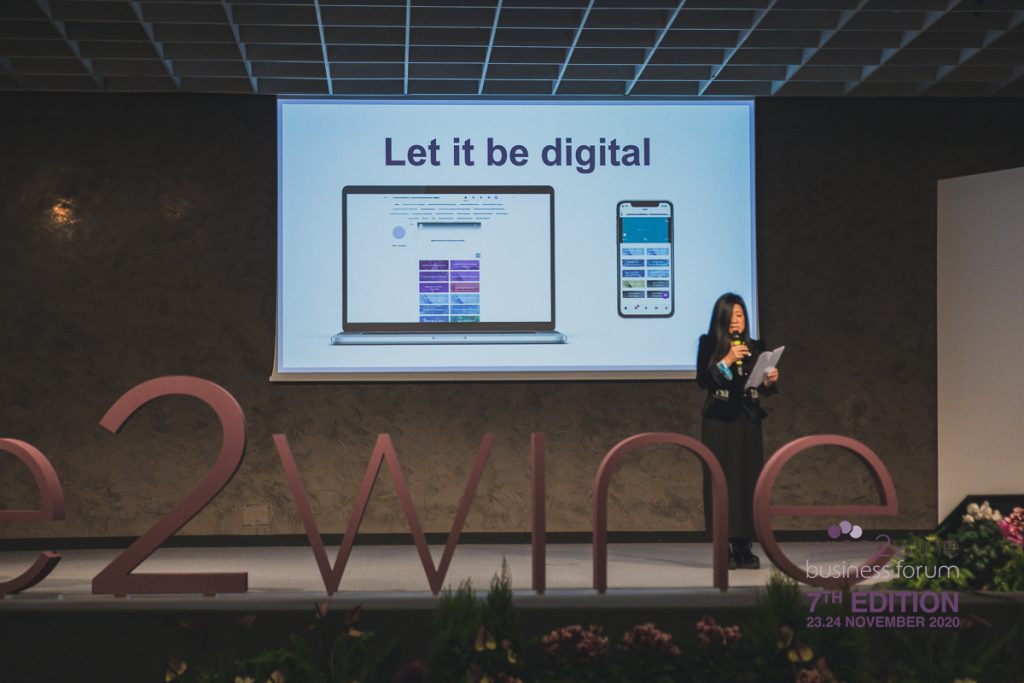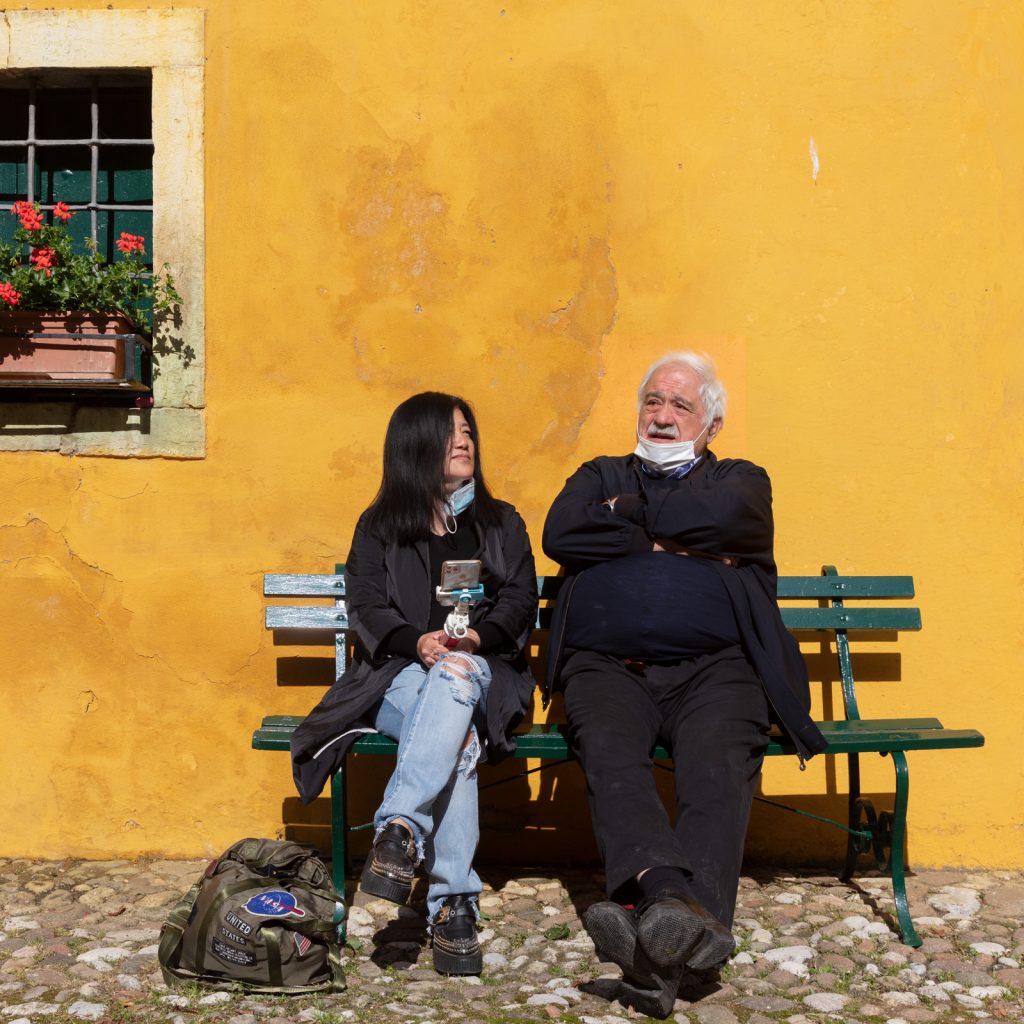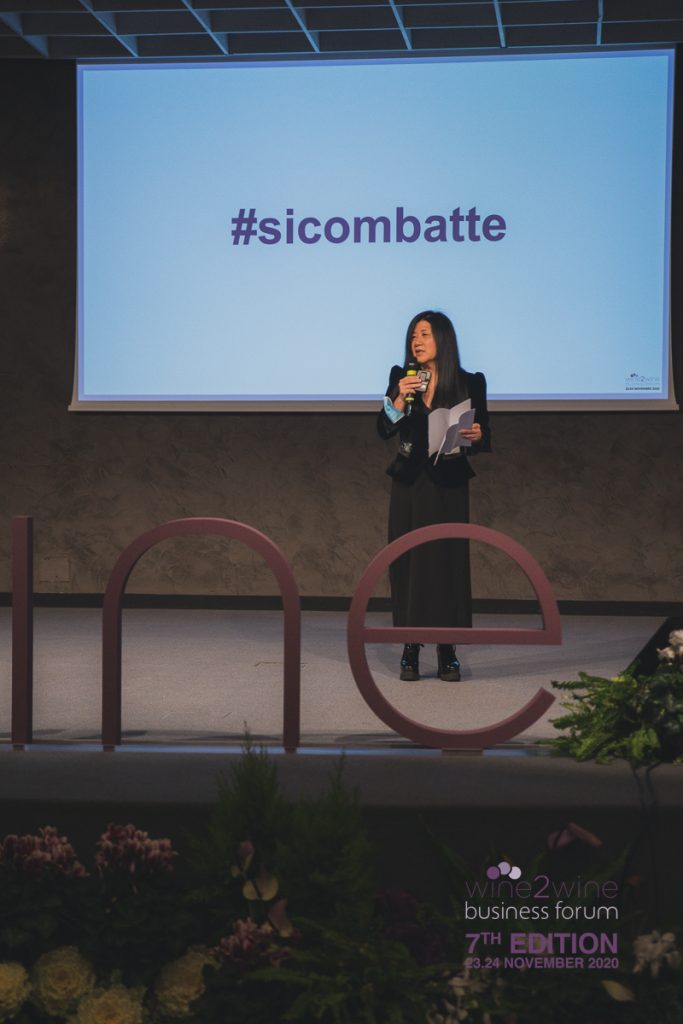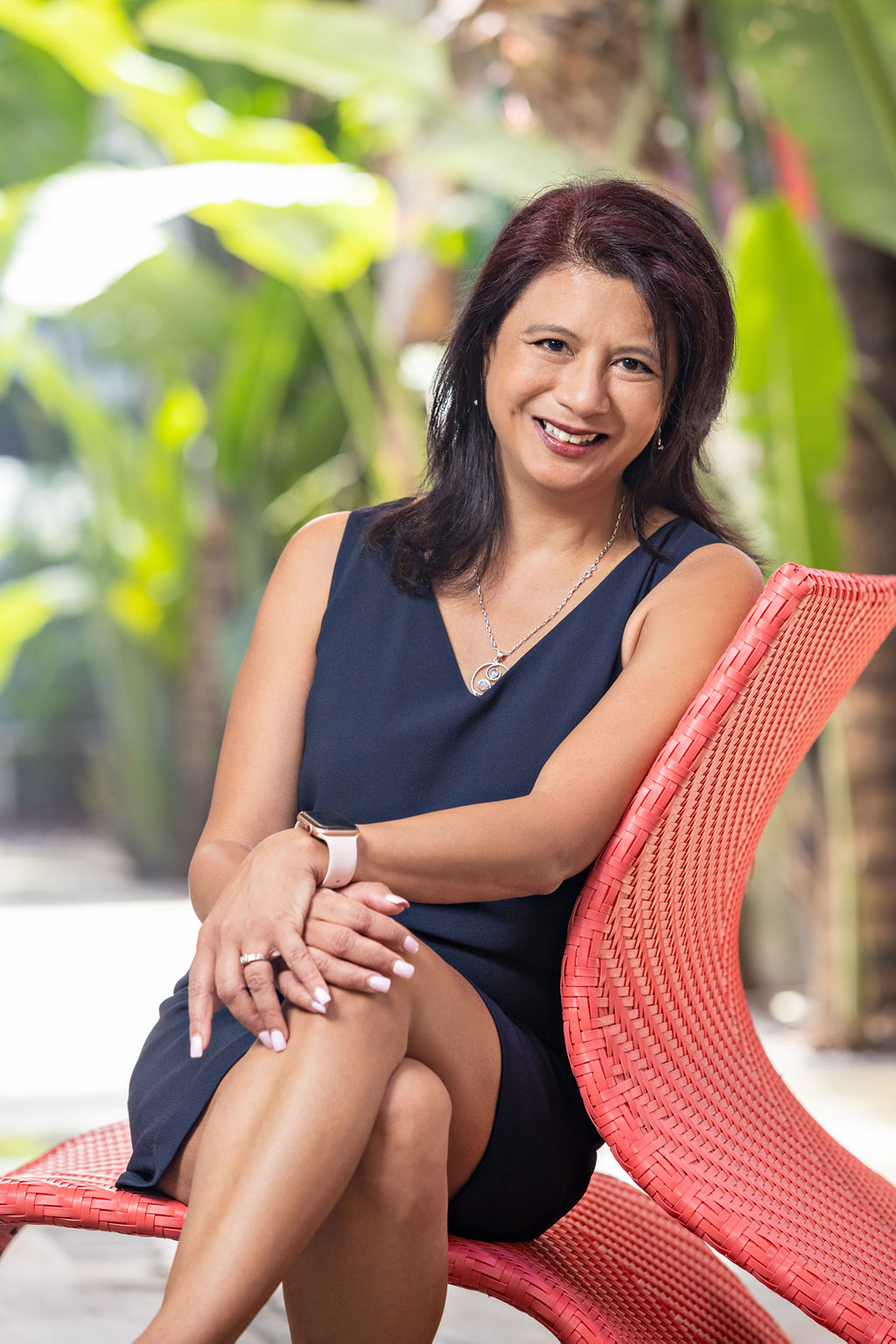Thinking Outside of the Italian Wine Bottle: Chat With An Expat
If you work in the wine industry, Stevie Kim should be a household name. If her name isn’t familiar, Stevie (born in Korea and raised in the United States) is the Managing Director for Vinitaly International: the strategic partner of Vinitaly, the largest wine and spirits exhibition in the world. To attend the annual fair in Verona, you need to be working in this field or studying wine. However, the Italian Wine Cult Leader, as she has been fondly named, is helping to spread the ‘wine gospel’ making sure that you get to know better what’s in your glass. Vini Italiani disciples come from far and wide to take a deep dive into Italian wine, ‘grape by grape’–all 600+. But ultimately, ‘snob’ is erased from ‘wine snob’ because if Stevie can understand it, so can you!
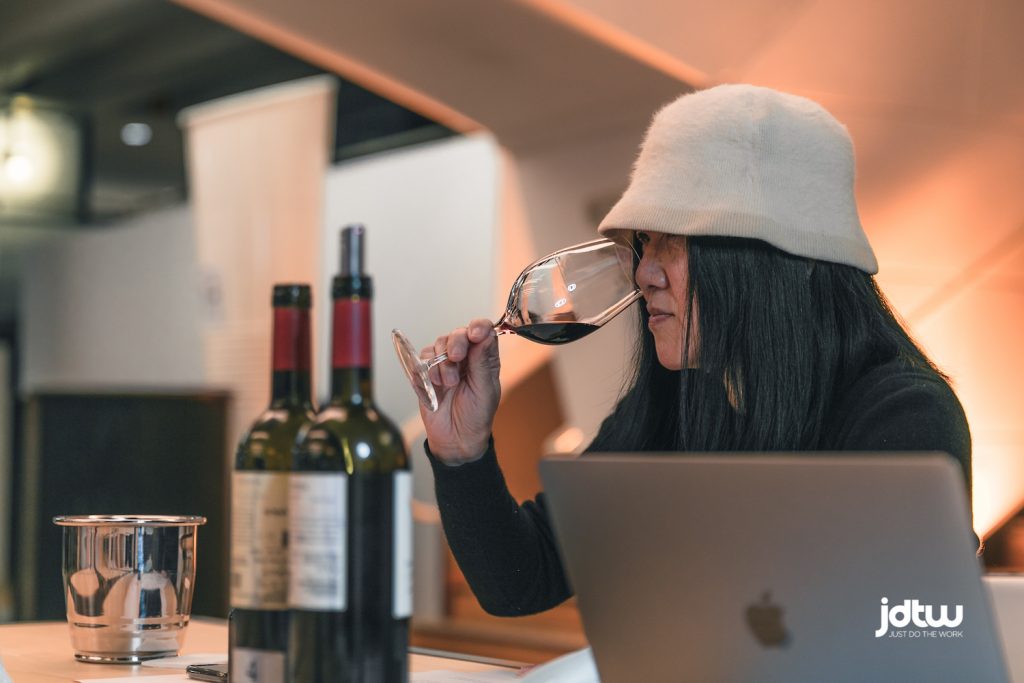
Stevie has carved out her place in a male-dominated industry as a woman, foreigner and, initially, with no prior experience in wine (apart from just loving it). She’s a tour de force who has shaken up quite a few Italian wine producers and business leaders with an unprecedented social media and digital marketing strategy. And rather than turn an occasional bad day into something worse, Stevie finds time to have fun on social media too: just follow @StevieKim222 and Mamma Jumbo Shrimp on TikTok to see.
We hope you enjoy reading (and watching) this month’s Chat with an Expat.
Who is Stevie Kim?
I promote mostly Italian wine in various forms on behalf of Vinitaly. Vinitaly is actually a brand and not a separate company. It’s an annual wine fair which takes place annually in Verona between March and April and now in its 55th edition. Vinitaly has a very long history and each year welcomes more than 4,000 Italian wine producers and hundreds of thousands trade visitors from all over the world.
What I do is mostly the promotional arm: to promote Vinitaly through various products. One includes an event called Opera Wine which happens the day before and is a premier event which opens Vinitaly.
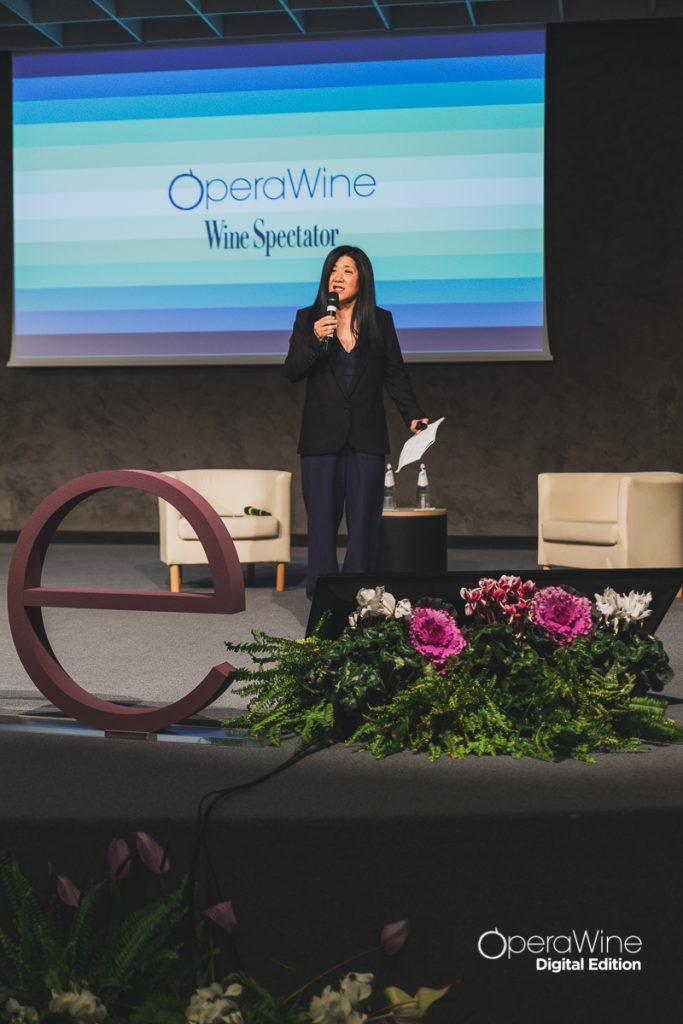
600+ Native Italian Grapes
The other things that I do are education related through Vinitaly International Academy. The reason why I started that was because I think Italian wine is so complicated. There are literally more than 600 identified indigenous grape varieties and more than 400 consortiums (consorzi), plus the DOC’s and the denominated areas. Nothing I feel does the deep dive into Italian wine, so this is the reason why we started this very intense 5-day program. If all goes well, we’ll also be going back to North America very soon.
We do a flagship in Verona just before Vinitaly for five days that welcomes top qualified professionals including Masters of Wine and Master Somm’s, plus often WSET Diploma holders. These other programs don’t really do the deep dive into Italian wines the way you should.
That is the rational why we started the Vinitaly Academy. We of course, go into other countries to do promotion and two of our top cities are in Russia: Moscow and St. Petersburg. Maybe because we are close. Italian wines perform very well in Russia, so we also have an annual event there.
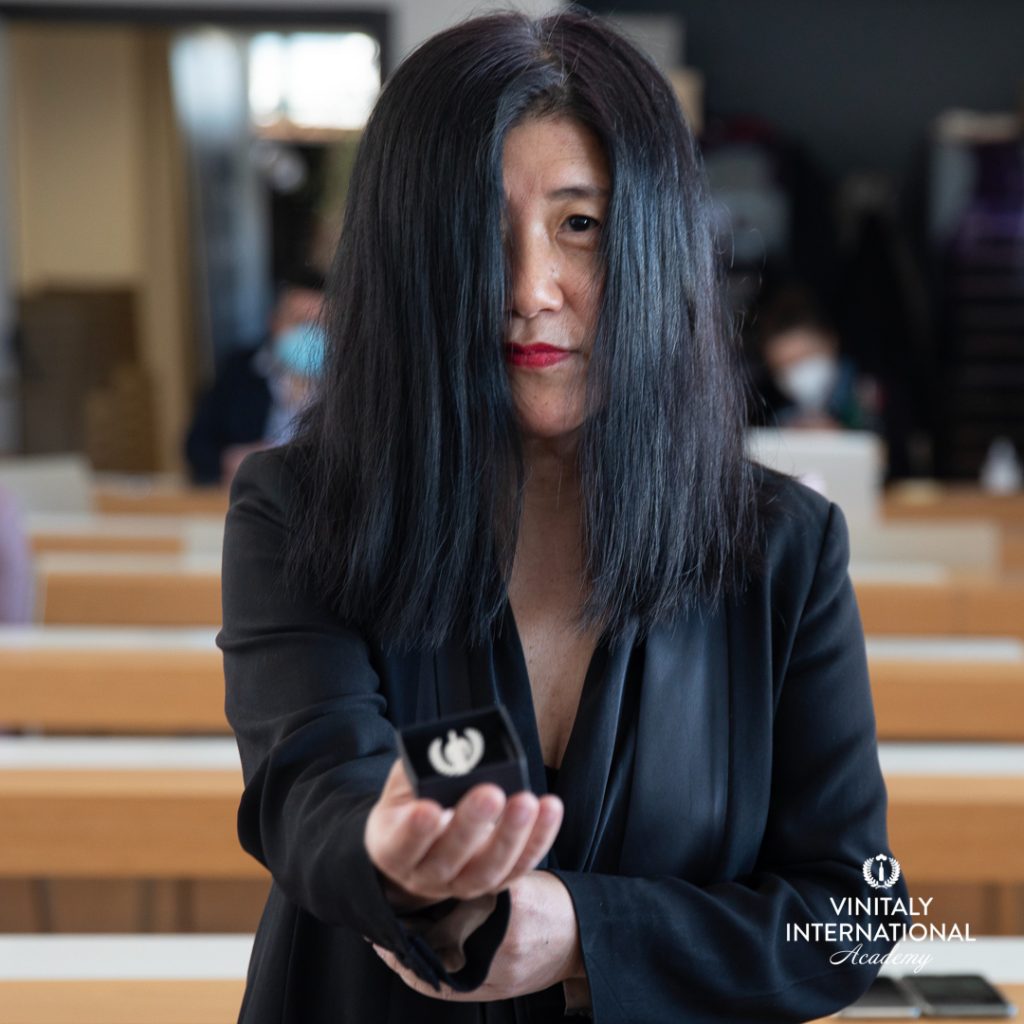
I also started 5StarWines and Wine Without Walls that is dedicated to the natural and sustainable (organic) wines and they also happen before Vinitaly. I call it the Vinitaly Marathon because it’s two weeks of different events that happen before, during and after Vinitaly.
One last thing is our wine business forum called Wine2Wine and that is an annual event for the trade professional. We have about 70 workshops that take place within two days, includes about 100 speakers and about 2,000 participants from all over the world. It’s a huge event to share business ideas.
How old were you when you emigrated to the United States and where did you grow up?
I guess about 10. I first moved to Ohio because my aunt was living there. She invited the family. Then, we moved to New York.
Where did you go to school?
NYU (New York University) and then I worked in the States for a while and my last job was at Price Waterhouse before it was PwC. I am dating myself! Then I took a sabbatical and after moved to Italy.
Why did you end up living in Italy?
Europe was always my calling. As you know in the US, people only get about two weeks off. So, I decided to take a year off. A friend of mine was a professional sailor and she invited me to go sailing in Greece for two months with her crew. I jumped at the chance. We stopped in Verona to see friends and after the sailing trip ended, I came back to Verona and that’s when I met my Italian husband, “my original sin!” In fact, he is very Veronese. Being Italian, he is not very adaptable so I decided to stay in Italy and here we made our home. I think that women are more adaptable. Not to make a gross generalization, but women adapt more to every situation in life better than men.
The plan was to do my graduate studies at home, but because I stayed in Italy, I decided to complete an MBA at Bocconi University (Milan) because it had an English program.
You also have a post graduate specialization in Wealth Management from The Wharton School of the University of Pennsylvania. What at the time was your intended career path?
Every summer since I’ve had children, I would go back and forth quite a bit. I logged lots and lots of miles every year traveling for work and personal reasons, so it wasn’t a big deal to do the program which took place in the summer. It was very convenient. I thought of starting a wine investment fund but unfortunately, or rather fortunately I did not launch it because there was the financial crash.
Joining Vinitaly
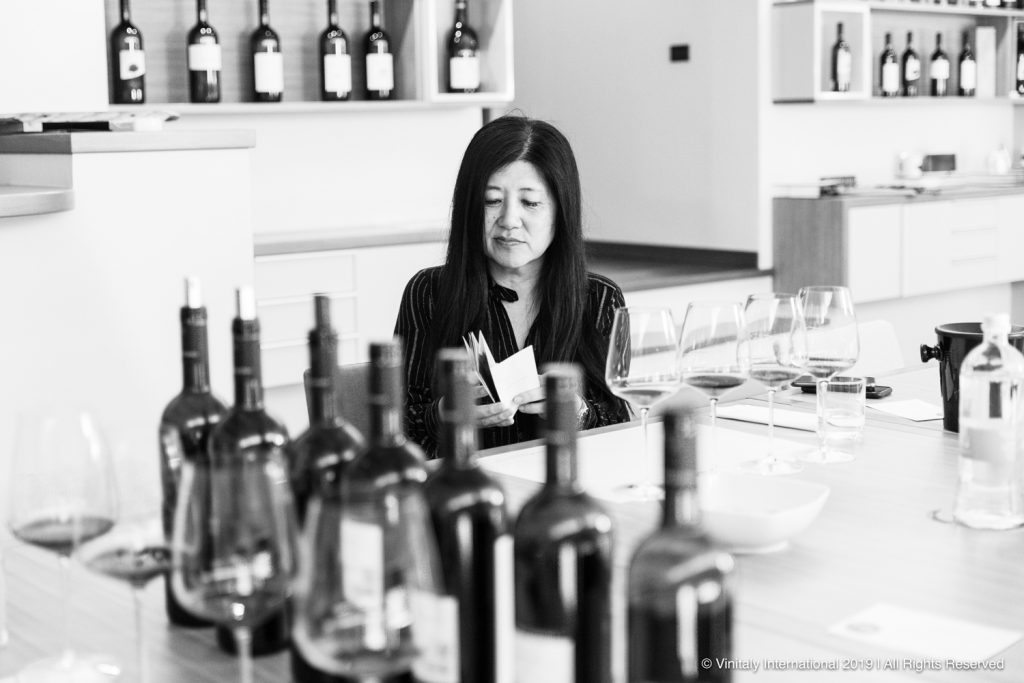
Then, I wanted to launch this fund at Vinitaly, but instead, they recruited me to help with the international development. As I got into it, I fell in love with wine. My first initial plan was to propose Veronafiere (which is the organization that owns Vinitaly) a joint venture with the Hong Kong (wine) fair organization because I had seen that Hong Kong was going to become the center for premium wines. That didn’t pan out because the organization is quite similar to Verona which is somewhat kind of like state run agency and of course, because Hong Kong was becoming more Chinese. It became too complicated.
We then organized the Italian wine pavilion for the first time for this other trade exhibition and that’s how I started getting involved in wine. I loved it! You can promote it and drink the goods and I was like, “this is fantastic…love it!”
That’s when I started thinking about how I could contribute to the promotional marketing aspect of Italian wine.
Side Hustles
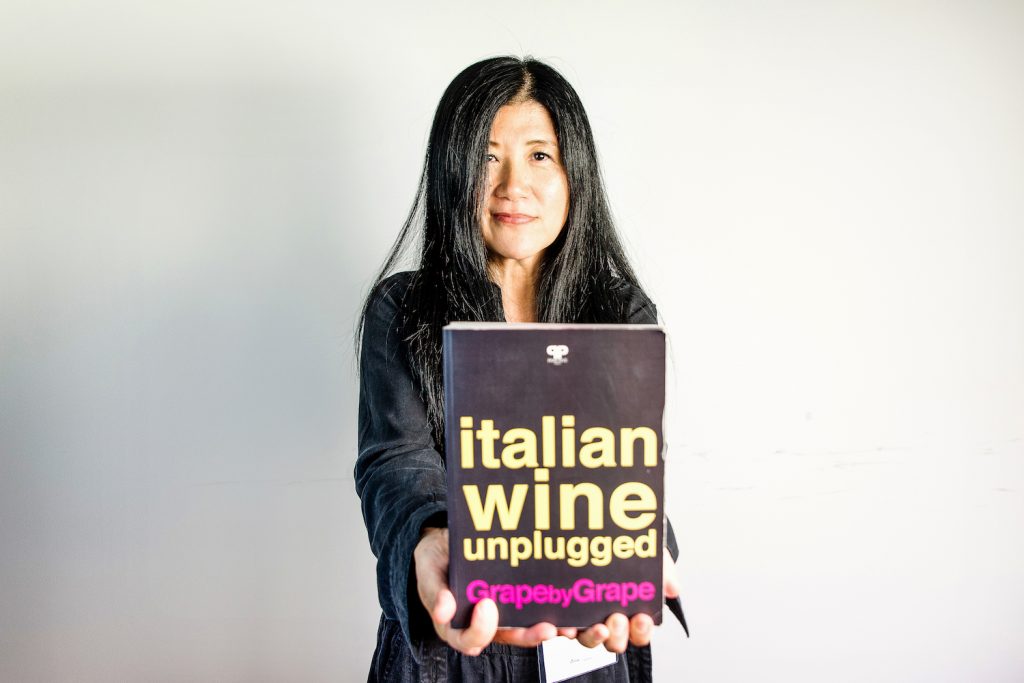
I am an entrepreneur and still own other businesses. Plus, I am a publisher and have other consultancy businesses. I also started a school for medical doctors and psychologists which is very similar to Vinitaly Academy. It offered the first master’s program for cognitive behavioral therapy for eating disorders and obesity.
Thinking Outside of the Wine Bottle
I think the pandemic has taught us that you can do things in a different way. I think sometimes coming from the outside, not from the wine world, has helped me churn out different products. When I started, it was very important to bridge the gap between the wine snobs, critics, and educators to people who are actually drinking the stuff like the clients and customers–whether they’re from trade or a consumer. If they are talking two different languages, it’s not accessible by the consumers or anyone else for that matter. Then, it isn’t a very successful way to communicate. Again it did help that I was an outsider.
My mantra is that if you can make me understand, then I can make others understand and this is a good way to communicate.
An Outsider Entering the Italian Wine World
I think my role especially in the beginning, was a lot more controversial then it is now. Because I was not Italian or a wine expert, they wondered how could I represent it? But like we were speaking about before, I thought if can understand it and explain it, then I think everyone else can. There are quite a few women in wine and winemakers now of course, but if you go to the board meetings and to executive movers and shakers there still aren’t many women, not to mention foreigners.
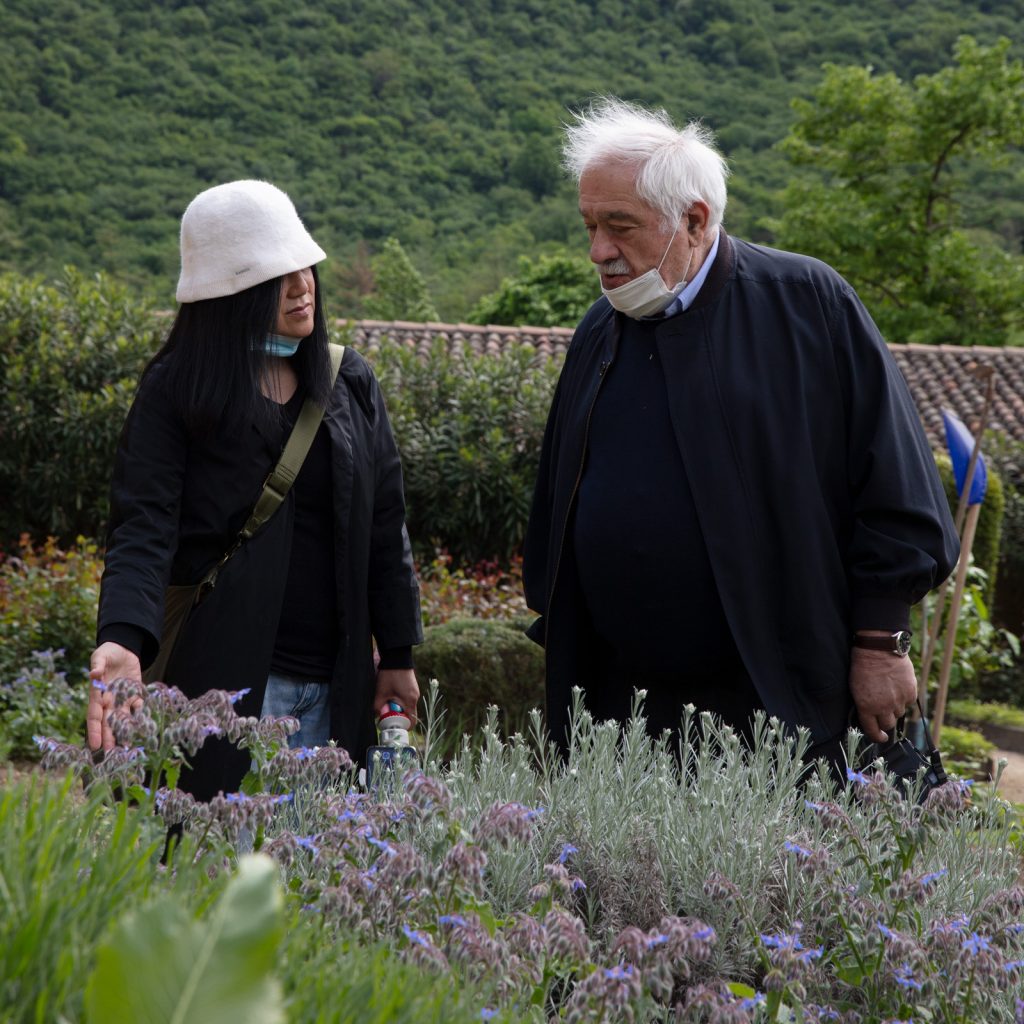
Still today, I’m not completely accepted by all. I think though, Italy and the wine industry has come a long way and especially during the pandemic, we all did a lot of soul searching.
Committed to Inclusion and Diversity
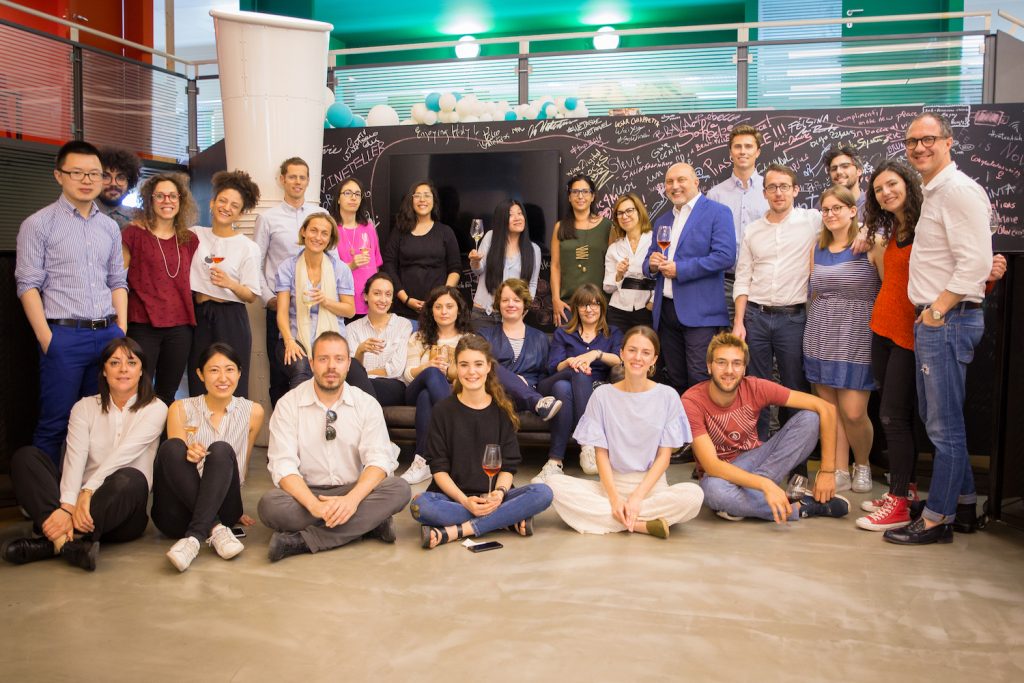
In my company, we have people from all over the world and of different sexual orientation. This was not well accepted by many, but I’m still a believer in that.
When I started The Italian Wine Podcast, no one knew what a podcast was. During the pandemic, we started having a show every day. We now have more than 600 episodes. We’ve also reached 1 million listens. We have a series, “Voices” that is dedicated to diversity and inclusion.
A lot of the people who I recruit to interview have been from Clubhouse. For me it’s been absolutely fabulous because I’ve met people who I had never met before.
A New Yorker in Italy
I think it works two ways. One, I feel like New Yorkers are assertive, but most of the Italians I know will think of that as being aggressive. For me it’s about asserting your perspective and your interpretation and people are not always comfortable with that. Especially, when it comes from me (as we said) a woman and foreigner with no background in wine. The other side of that is that they appreciate that, once in a while, I’ll have a great idea because it’s something that they hadn’t thought of. I’m constantly pushing the envelope. And, when things go wrong I’m a good scapegoat! They’ll say things like: “Oh, because she doesn’t understand our culture.” To give credit where credit is due, Veronafiere has taken a chance in bringing someone on like me at this level of management. They did allow me to experiment because they wanted to innovate.
Social Media: The Good and The Bad
I think social media gave an opportunity to talk to a few people at a time like one-to-one: a direct line to the consumer. I felt this was incredible.
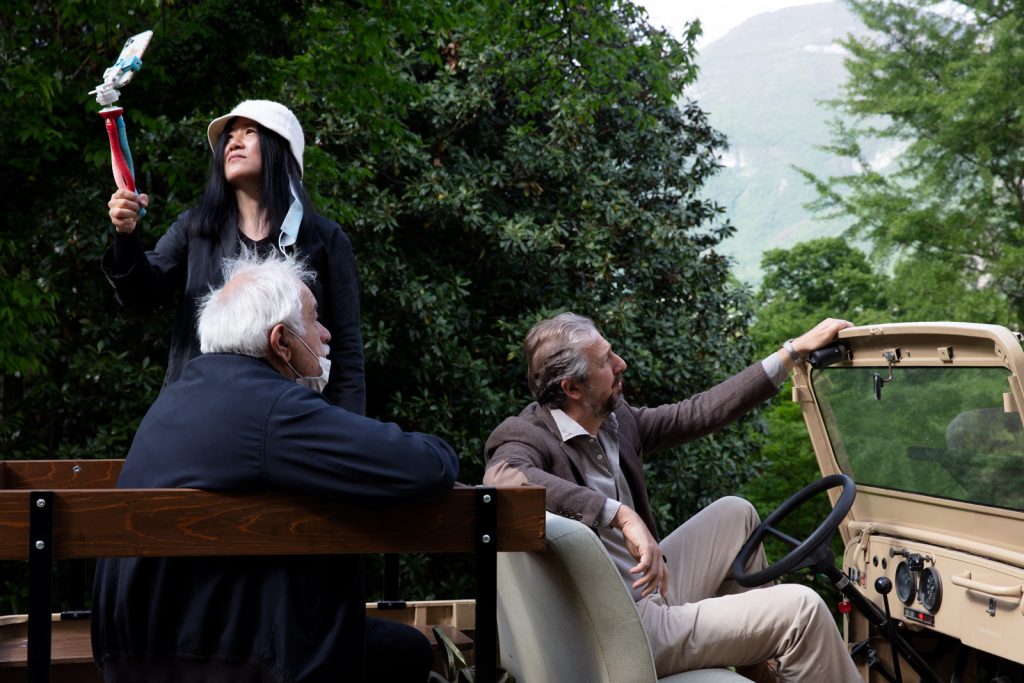
I think social media is good and bad. When I first started with Vinitaly, social media wasn’t that popular. I embraced it completely because I saw that there was such a great opportunity. In traditional media you spend tons of money to get your message out there. And the PR companies survive because clients get ‘free’ advertising through interviews and great product placement etc. In the early days, I watched Gary Vaynerchuk and said, “This guy’s a genius!” He makes it accessible and not intimidating.
Social media is about timing and the platform. I personally chose LinkedIn as the first social media platform for Vinitaly because it was a B2B platform. I tried to get as many as possible wine producers on LinkedIn and every single time the producers would say, “I’m not looking for a job. Why do I need to be on LinkedIn?” So, we’ve come a long way. The only thing with LinkedIn is that it’s still banned in Russia. In China, Facebook, Instagram, sometimes Google, and Twitter are banned, but LinkedIn is okay.
Social Media Strategy
I started with LinkedIn, then Twitter followed by Facebook because this was before Instagram. I had an interesting discussion with someone very important in the industry because they used to always say that social media is free. This person is a guru in the wine industry and I’ve always said that social media is not free. It’s like when they’re saying PR is free. Someone has to do social media (the work), has to strategize: the messaging, branding, graphics and videos like Reels, IGTV and TikTok. It’s not free and this is what people don’t understand – like PR. Now everyone thinks they can do their own PR and social media. It’s fine at a personal level, but as a company you either have to learn how to do it by dedicating time and resources, or you need to pay somebody to do it. Whether it’s in-house or outsourcing.
It takes a while to have this kind of conversation with the producers, but also everybody else in the industry including the companies that I work for. So, the approach was gradual. The way I see it is that there is not one solution for everything.
Clubhouse
It’s like Clubhouse: everyone was so crazy about it in the beginning and now everyone is downplaying it, but it’s exactly the way you approach it. The way I do it is more conferencing and like a fireside chat. It is very structured like running an event. Every time, I think about what is the audience and what are the takeaways?
And because it’s so much work, I record it and repurpose it as a podcast.
The wealth of information you can get is very significant. You also have to think about Instagram (as an example): is your feed more for trade; consumer; commercial; is it philosophical or educational? I think these are all the things that you have to have clear in your mind before you approach the social media platforms.
Authenticity
To say that you do one thing for everybody is like the old way of doing traditional advertising. You pay for an ad and then hope that it gets to as many people as possible. That’s not the way to do social media. It’s also about authenticity. I think the days of just posting beautiful, perfect photos for Instagram are numbered.
Stevie’s personal Instagram (8K+ followers and only follows Vinitaly)
No, no, you know how it is. When you follow somebody then you have to follow another, so I don’t want to get into that! My personal feed is like my diary of what I do and what I’m up to. I’m also entertaining myself. If I feel like crying about something, I rather laugh, so I post something funny. When I used to travel every other week, no one ever knew where I was so they would go to my social media. It’s also good because when you’re working on a special project and you go back to look at it five years later, you can find it and remember.
It’s crazy, but with all the different channels that we manage (more than 100), I am very methodical. But when it comes to my own feed, there’s no rhyme or reason and I don’t care if it gets one view or 5,000.
Do you manage your personal social media?
I manage it, but one of my colleagues has access to it, but I’m doing the posts myself.
Best Way To Reach the Curious Wine Consumer
People go to wine shops where there are so many choices and they always go to Pinot Grigio or Champagne because that’s what they know
I actually think the best way to find different types of wine is to go to specialty wine shops. The people who run them will know about their small to medium and large producers. I don’t think people take enough advantage of that, especially now when you can find everything online. The wine shop people are so knowledgeable and passionate, and know everything about the winemakers.
Are wine influencers valuable to Italian wine lovers?
Like you said, influencers are for the most part sponsored for recommendations. Then although there aren’t many bloggers anymore, the ones left are really passionate about wine. If you can find a handful of your favorite writers, they will give you direction and great suggestions.
Once you start, it’s a snowball effect and you’ll find your critical mass not of influencers, but people who can influence your choices in wine. Then you get to a certain level and influence your own decisions.
Are you finding through all of your platforms that more and more small, boutique wineries and not just the big producers are embracing technology?
I still think the concept of conversion (to the website or call to action like sales) is still a little far off for the smaller producers. Actually some of the small producers are a lot savvier than the big ones. All the connectivity is important. Beautiful photos on Instagram or the beautiful feed lead to a bunch of likes, but that doesn’t necessarily translate to anything beyond that. I think now more producers (no matter what the size) understand the power of social media, but I still think haven’t optimized the connectivity and conversion back to their website.
About Books Published: Italian Wine Unplugged, The Jumbo Shrimp Guide to Italian Wine, etc.
During the pandemic, one of the wonderful things that my colleagues have done is to come up with a small book that is a synopsis of Italian Wine Unplugged (a textbook produced for the Vinitaly Academy students). It’s pocket sized and has more storytelling and illustrations.
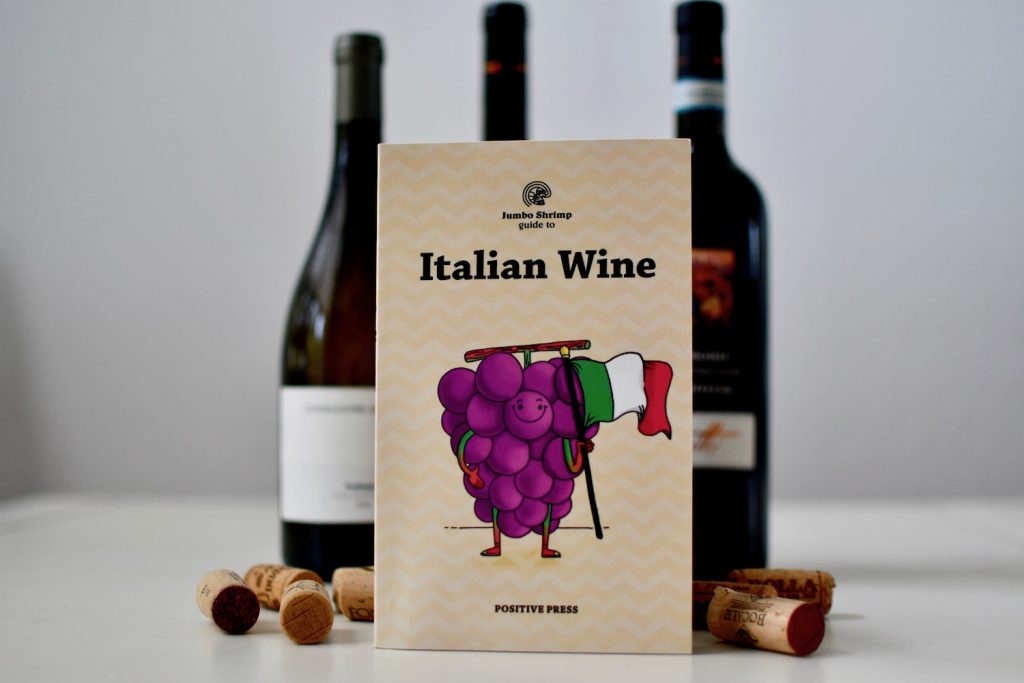
Where did the title, “Jumbo Shrimp Guide to Italian Wine” come from?
Jumbo Shrimp is an oxymoron for a huge amount of information reduced to a nugget, pocket guide. There’s actually a series and now we are coming out with international grape varieties for Italian wine. My colleagues were going crazy over the title, but Jancis Robinson gave a huge raving review including the name Jumbo Shrimp so now everyone is happy. Also, if you are not a book person, we read excerpts of the book on the podcast. This book will save you. Even the certified Italian Wine Ambassadors, swear by it and carry it with them wherever they go.
How Do You Define Expat?
I have to be honest, I don’t feel like an expat. I feel American and I am in Italy–an Italian American. But when I am in America, I feel more Italian or European. Expat can go both ways. Also, I’ve been living here for quite a long time–most of my grownup life. However, on Clubhouse I discovered an expat community and it’s wonderful. I’ve now connected with women who I’d never met and they’re interested in wine, food and travel. And some work in the business, so I’m looking forward to connecting with them also in person. This is also social media and the huge distance can become very, very small.
Home Life
My husband is Italian, but he looks German. Whenever we go to places especially around Verona where there’s a huge German tourist population, they’ll always speak to us in German. We have two children: one (a daughter) has just turned 24. She is actually Russian—we adopted her when she was three. Our other daughter is 20 and she lives in Utrecht right now.
What languages do your daughters speak?
I only speak to them in English and we had nannies who spoke English because them speaking English was very important to me. They speak Italian to their father. It’s a very natural thing in a bilingual family. When we have dinner, everyone understands both languages. Then, the problem arises when we have guests. (We try not to have too many by the way). When they first come, they are completely shocked because we’re just speaking like we do and they don’t know what language to speak!
And at the office?
In the office, we speak mostly English. Some of our colleagues don’t speak Italian at all and some of the Italians understand, but don’t speak English. We’re completely functional or dysfunctional!
Are you fluent in Italian?
In theory, I should be. With Italians, I speak Italian. Also, I don’t have patience if their English is terrible! If you are in board meetings you have to do everything in Italian.
What do you love about living in Italy?
Despite how Italians are so melodramatic about everything, I think the quality of life is great here. The people and culture are wonderful, wonderful food and everything! I think you get to the point of when you ask, where do you want to live for the rest of your life? Ideally, I would like to live in Italy but also visit the States as often as I can. My entire family is still in New York. That is still part of me.
In Italy you make a lot less money, but you need a lot less money to live. The quality of life is still very good here. Also during the pandemic, I think I realized that things like universal health coverage is important. Europeans take it for granted. I think that is still part of the important values in life and I think that’s where my heart lies.
Is the traditional Korean family upbringing similar to the Italian one?
Honestly, I’ve not been part of that for a very long time, although the imprint is very strong. Traditional values are still important and if I didn’t have that traditional imprinting, I would have divorced my husband at least 30 times! I’d say about 80% of my friends are either divorced, separated, or single. They always ask me, “what is the secret of your marriage?” And I always answer, “it’s really simple. We never see each other.”
In life you have to make compromises. There are the good and bad things in both worlds. As an expat, it means getting back to where you are at the moment. The old cliché, the grass is always greener on the other side. I didn’t understand that until I got to a certain age.
Is there anything that you miss?
I miss the food. I know that sounds crazy coming from Italy. It’s about the variety, especially the Asian food. There are no Korean restaurants yet. Now Japanese food is quite popular, but I can only get Korean food when I go back home. (I can get it in China in Russia though.)
Save the Dates!
Oct 18-19, 2021 – Wine2Wine
Apr 10-13, 2022 – Vinitaly
Website: https://vinitalyinternational.com/
Instagram, Facebook, Twitter — @steviekim222
LinkedIn — Stevie Kim
TikTok — @mammajumboshrimp
Clubhouse — Stevie Kim
You May Also Enjoy Reading…
Kylie Flavell Grows Romance Somewhere Between Artistry and the Algorithm
Tiramisù with Cherries: A Recipe for Love
Romagna Mia! Great Strides in Romagna Wine
Maremma and Sicily: An Unusual Pairing
A Conversation with Sabrina Schench about Trentodoc

